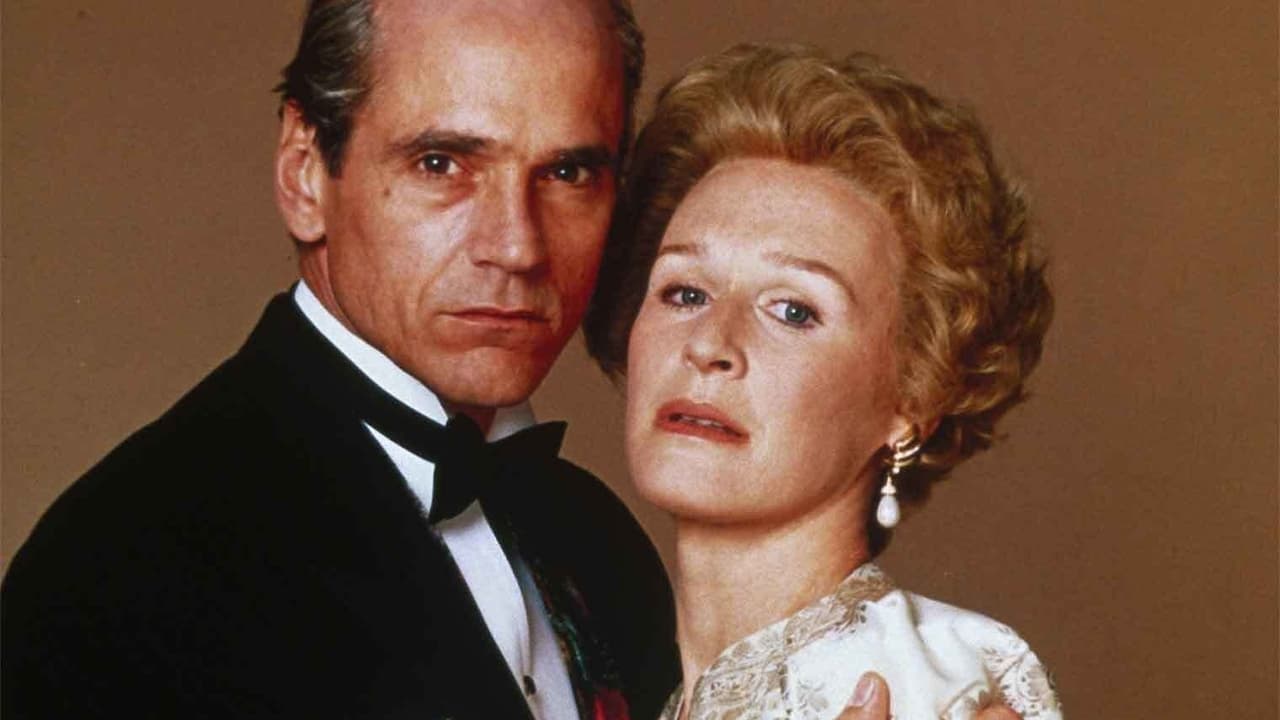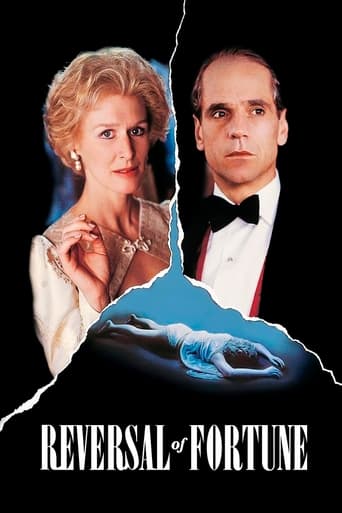

Lack of good storyline.
... View MoreCharming and brutal
... View MoreA Brilliant Conflict
... View MoreClose shines in drama with strong language, adult themes.
... View MoreChecked out and watched the legal drama "Reversal of Fortune" which is based on the real life attempted murder case and overturned conviction case of rich and well known European aristocrat Claus Von Bulow(in an Oscar winner role for Jeremy Irons who's sly and cunning in his acting). And this is a legal picture that's a little different from others it stays away from the courtroom drama scenes and most focuses on the behind the scenes legal theory and work by Claus's defense team which was headed by famed defense lawyer Alan Dershowitz(Ron Silver)and a group of his former students that he taught at college. The story is compelling and interesting as this happened not once but twice as Claus was convicted of twice trying to kill his elegant socialite wife Sunny(Glenn Close)and Claus is a spoiled playboy a guy who has a mistress on the side, yet still Sunny had a drug and alcohol problem, and the way the film shows the scenes it leaves it up in the air as to whether Claus gave Sunny the dose or did she overdose herself in a suicide attempt? As questions still linger at what happened at this 1980 Newport mansion.The film is also based on defense lawyer Dershowitz's book as I mentioned most of the picture on the other story side is a focus of the legal work and theory put forward by Alan and his legal team of ex law students and current students waiting to pass the bar. It's really like a legal theory classroom showcase! All in all the film is a catch with interest it still has a drama suspense feel to it as after I watched I still asked the questions did Claus do it or not? "Reversal of Fortune" is one legal theory movie to watch.
... View MoreMartha Sharp Crawford von Bülow--known within her circle as "Sunny"--a rich American socialite unhappily married to an unemployed, womanizing lout, slips into an irreversible coma and all fingers point to cucumber-cool husband Claus, who hires a Harvard-based legal team to win his appeal after he is found guilty of attempted murder. Real-life case isn't a baffler, and the staging by director Barbet Schroeder sometimes resembles a waxworks museum, yet Oscar-winner Jeremy Irons (sounding a bit like Boris Karloff) and Glenn Close are well-cast in the leads. Portraying this hapless gruesome-twosome, the stars don't exactly convince us they're the von Bülows (the films teeters between handsome reenactment and caricature--with the comatose victim as pithy narrator); however, the film is marginally engaging as a well-heeled exaggeration of events, with Ron Silver bringing his usual focus and conviction as legal-eagle Alan Dershowitz. ** from ****
... View MoreAdapted from the 1985 book Reversal of Fortune: Inside the von Bülow Case, written by law professor Alan Dershowitz, 'Reversal Of Fortune' is a superb film! Barbet Schroeder directs this Murder-Mystery in an atmosphere that has potential and a lot to explain.It recounts the true story of the unexplained coma of socialite Sunny von Bülow, the subsequent attempted murder trial, and the eventual acquittal of her husband, Claus von Bülow, who had Dershowitz acting as his defense. As a cinematic experience, it's a must watch. The most freaky part is that it's a true incident.. the poor Sunny died few years back! Claus, on the other-hand is still alive.Moving on, coming to the high-points of this film: Schroeder's direction is fantastic. He makes every move neatly. Luciano Tovoli's Cinematography is outstanding! He captures each frame with style. Acting wise, Jeremy Irons is dignified in a role that won him the Academy-Award for Best Actor! Glenn Close is terrific. The legendary actress steals the show with a haunting performance. Ron Silver is hugely effective. Felicity Huffman, in a brief role, is perfect.This true story is a must watch... it's one cinematic experience! Thumbs Up!
... View MoreOn 21st December 1980 Martha ("Sunny") von Bülow, the wife of the aristocratic Danish socialite Claus von Bülow, collapsed at the family's mansion in Newport, Rhode Island, and fell into a coma from which she never recovered. (She eventually died in 2008). Claus was accused of attempting to murder his wife by injecting her with insulin. The prosecution alleged that his motives were financial; his wife, an heiress in her own right, was considerably wealthier than him, and it was alleged that after her death he hoped to use her fortune to marry his mistress. At his first trial Claus was convicted and sentenced to thirty years imprisonment. This verdict was quashed on appeal, and he was subsequently acquitted in a second trial. There have been a number of good films, such as "In the Name of the Father" and "Let Him Have It" which have told the true stories of real-life miscarriages of justice, but "Reversal of Fortune" is not really a film of this type. As Claus von Bülow was eventually acquitted, the film-makers could not, without inviting a writ for libel, imply that he was guilty of the attempted murder, but for some reason they seemed equally unwilling to state definitively that he was innocent. (Possibly because they were unwilling to offend that large section of American public opinion which had taken a dislike to a supercilious European aristocrat and had judged him guilty). Consequently, we do not see very much of his life with Sunny (and what we do see is shown in flashback), and we see nothing of the first trial in which he was convicted. Jeremy Irons was awarded the Academy Award for Best Actor for his portrayal of von Bülow, although I have never understood why. It is not in my view Irons' best performance; he has given better ones in "The French Lieutenant's Woman" and "The Mission", which came before "Reversal of Fortune", and in the likes of "Waterland", "The House of the Spirits", and even "Damage", which came after it. None of these films even brought him a nomination. Nor in my view was this the best acting performance in 1990; that to my mind was Kevin Costner in "Dances with Wolves", although Gerard Depardieu might also have had a claim for "Cyrano". The Academy, however, doubtless felt that Costner would have to be content with "Best Picture" and "Best Director" and that to give him a third award might make him big-headed. As for Depardieu, the Academy has always had a bias in favour of American movies and against foreign ones, especially foreign-language ones. (In 1990 no actor had ever won "Best Actor" for a foreign-language performance). Irons' performance here is not a bad one, but it is to my way of thinking too one-dimensional to be worthy of an Oscar. He plays von Bülow as a cold, self-absorbed individual, speaking throughout in the sort of aristocratic British accent that today even most British aristocrats would find a bit too fruity for their tastes. (Although von Bülow was Danish by birth, he was educated in England). He never displays any real emotion; neither the tragic fate of a woman he once loved, nor the prospect of having to spend thirty years in jail, can rouse him to any display of feelings. Although the film never directly states that von Bülow was guilty as charged, we never feel for him the sort of sympathy we would normally feel for a man wrongly accused, and on an emotional level it would be all too easy to visualise Irons' character as a man quite capable of trying to murder his wife for her money. Indeed, in many ways the film is more about von Bülow's lawyer Alan Dershowitz than it is about von Bülow. (This is not surprising, given that it was based upon Dershowitz's book about the case). Dershowitz is portrayed as a left-liberal radical lawyer, who takes the case less because he is convinced of his client's innocence but because he believes that important principles of law, particularly those relating to the admissibility of evidence, are at stake. The film concentrates upon the appeal proceedings in which Dershowitz persuaded the Rhode Island court of appeals to overturn the original conviction, but appeal hearings, which largely deal with technical points of law, do not generally make for great excitement, and the chance to make the film a courtroom drama was passed up. Unfortunately, the film does not find any alternative sources of excitement. The story is too slow-moving for my liking and the overall emotional temperature is far too cool. Whereas in films like In the Name of the Father" and "Let Him Have It" I could empathise with the plights of Gerry Conlan and Derek Bentley, in "Reversal of Fortune" I ended up not caring whether von Bülow was acquitted or not. 5/10
... View More